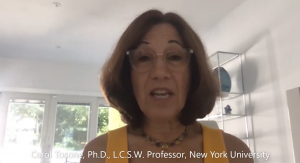Shared trauma: how one professional channelled her personal experience of 9/11 into research that shapes our understanding today

Published by PSW Magazine, 09 September 2021
Dr Carol Tosone was working in New York on the day the World Trade Centre was attacked. She was in her consulting room with a therapy patient when they heard the planes go over the city and hit the Twin Towers.
Her experience led her to research fellow clinicians working in Manhattan, and that work has informed much of her post-9/11 career.
Her principal area of research is shared trauma, particularly the dual experience of being directly exposed to a trauma and also experiencing it through the trauma narratives of clients.
Dr Tosone, a Professor at New York University’s Silver School of Social Work, has also written on shared trauma during Covid-19. She edited a volume of perspectives from social workers and academics - Shared Trauma, Shared Resilience During a Pandemic.
BASW invited Dr Tosone to speak about her work, and in a video presentation for members she says:
“We often become interested in a topic because of our personal experiences. And I have a personal experience related to 9/11 that really spurred much of the research that I've been doing since that time.
“When 9/11 happened I was actually sitting with a patient when a plane flew over the building. And my patient and I could hear an excruciating sound, but we weren't able to identify what it was. Then we heard the impact on the building. We were about a mile or so away but you could actually hear that impact, and we heard screams in the street.
“And then, of course, we heard sirens.
“As I went outside, I saw people crying in the elevator on their way out. We knew something very, very important had happened, something that was life altering. I could see the towers and planes, you could see people all around, sirens non-stop. It was something that made such a profound impact that even to this day we talk about pre 9/11 experiences and post 9/11 experiences.
“I wanted to know what other people had experienced. I had patients who worked in the towers. I had patients who worked nearby, as teachers, as personal trainers, and many of them had 9/11 narratives of being caught in the smoke.
“And when I talked with my patients who worked in the towers, when they contacted me later that day I was crying, I was weeping.
“There was a blurring of professional and personal boundaries in the care that I felt for my clients. When we talk about loving our patients or our clients there’s a sense of boundaries. In some ways, the feelings we have are of a love that we keep contained.”
Dr Tosone started asking colleagues in other parts of New York what they had experienced, and many reported similar feelings.
“That really spawned my research. I was teaching at the time, and many of my students were too preoccupied to focus on the content. So I made an assignment for them to report their experiences, to share their experiences with one another in writing.
“Then I had them look at literature that spoke to what they found. And it was the first article that came out of the research.”
This important first paper was a foreshadowing of further work on primary, secondary and shared trauma relating to 9/11, and work exploring professional trauma in social workers after Covid-19, Hurricane Katrina, and the Troubles.
Dr Tosone observes: “The people who felt supported by their supervisors, and their agencies fared better. These agencies, and our educational institutions, can serve as a holding environment.”
She also explores survivor guilt, and the stresses involved with managing workloads and finding support during times of great crisis.
“We need to be mindful of our personal reactions to what's happening,” Dr Tosone says. “We need to make sure that we put self care in place. And we also need to identify our support network, both the people we love, as well as the professional people who serve as resources for us.”
Further Resources
If you would like more on self care and wellbeing for social workers, contact england@basw.co.uk for guidance on how to develop CPD for social work in disasters and how BASW is supporting social workers through its Professional Support Service.
You can read about the work of Dr Tosone in her New York University profile.

